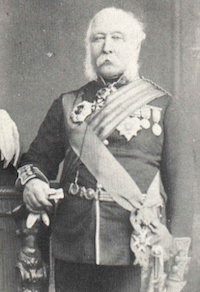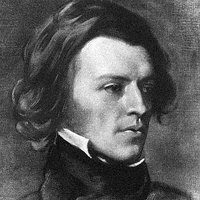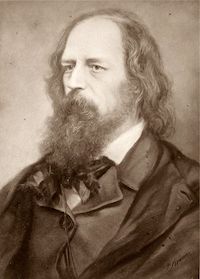The charge of the gallant three hundred, the Heavy Brigade!
Down the hill, down the hill, thousands of Russians, Thousands of horsemen, drew to the valley–and stay’d; or Scarlett and Scarlett’s three hundred were riding by When the points of the Russian lances arose in the sky; And he call’d, ‘Left wheel into line!’ and they wheel’d and obey’d. Then he look’d at the host that had halted he knew not why, And he turn’d half round, and he bade his trumpeter sound To the charge, and he rode on ahead, as he waved his blade To the gallant three hundred whose glory will never die– ‘Follow,’ and up the hill, up the hill, up the hill, Follow’d the Heavy Brigade.
The trumpet, the gallop, the charge, and the might of the fight! Thousands of horsemen had gather’d there on the height, With a wing push’d out to the left and a wing to the right, And who shall escape if they close? but he dash’d up alone Thro’ the great gray slope of men, Sway’d his sabre, and held his own Like an Englishman there and then. All in a moment follow’d with force Three that were next in their fiery course, Wedged themselves in between horse and horse, Fought for their lives in the narrow gap they had made– Four amid thousands! and up the hill, up the hill, Gallopt the gallant three hundred, the Heavy Brigade.
Fell like a cannon-shot, Burst like a thunderbolt, Crash’d like a hurricane, Broke thro’ the mass from below, Drove thro’ the midst of the foe, Plunged up and down, to and fro, Rode flashing blow upon blow, Brave Inniskillens and Greys Whirling their sabres in circles of light! And some of us, all in amaze, Who were held for a while from the fight, And were only standing at gaze, When the dark-muffled Russian crowd Folded its wings from the left and the right, And roll’d them around like a cloud,– O, mad for the charge and the battle were we, When our own good redcoats sank from sight, Like drops of blood in a dark-gray sea, And we turn’d to each other, whispering, all dismay’d, ‘Lost are the gallant three hundred of Scarlett’s Brigade!’
‘Lost one and all’ were the words Mutter’d in our dismay; But they rode like victors and lords Thro’ the forest of lances and swords In the heart of the Russian hordes, They rode, or they stood at bay– Struck with the sword-hand and slew, Down with the bridle-hand drew The foe from the saddle and threw Underfoot there in the fray– Ranged like a storm or stood like a rock In the wave of a stormy day; Till suddenly shock upon shock Stagger’d the mass from without, Drove it in wild disarray, For our men gallopt up with a cheer and a shout, And the foeman surged, and waver’d, and reel’d Up the hill, up the hill, up the hill, out of the field, And over the brow and away. Glory to each and to all, and the charge that they made! Glory to all the three hundred, and all the Brigade!
Bravery Out Loud
About the Poem
In 1854, Great Britain led a coalition against Russian expansion in the Black Sea.
On Oct. 23, they fought a great battle near the town of Balaklava in the Crimea.
The ‘three hundred’ of the ‘Heavy Brigade’ who made this famous charge were the Scots Greys and the 2d squadron of Inniskillens.
Two squadrons of the 1st Royal Dragoons charged on their own initiative.
The ‘three’ were Scarlett’s aide-de-camp, Elliot, and the trumpeter, and Shegog the orderly, who had been close behind him.

About General James Yorke Scarlett
Scarlett joined the army three years after Waterloo.
At the age of 55, he was close to retirement after a career during which he had not seen any combat service.
However, he had a sterling reputation as an officer, and it was said of his men "they are all very fond of him and will follow him anywhere."
They did.
Scarlett died at his estate in Burnley, Lancashire, at the age of 72.
An estimated 60,000 people, far more than the town's entire population, lined the streets for his funeral procession.

Tennyson

Tennyson older
About Alfred Lord Tennyson 1850 - 1892
Alfred Lord Tennyson was Poet Laureate of England during much of Queen Victoria's reign.
His father was an Anglican clergyman; his mother the daughter of a vicar.
Tennyson began writing poetry as a boy and won awards at Trinity College, Cambridge. However, he left before graduating to care for his widowed mother.
His first published volume of poetry was well received.
His second, which included "The Lady of Shalott", not so much.
Which so discouraged him that he did not publish again for ten years.
He struggled with depression his entire life.
When he did resume publishing, he become increasingly successful. His "In Memoriam A.H.H", a tribute to his sister's fiancee who died at 22, is considered his masterpiece.
The widowed Queen Victoria told him that it had been a "comfort" to her.
Tennyson contributed to the English language, the phrases: "Tis better to have loved and lost / Than never to have loved at all", "My strength is as the strength of ten, / Because my heart is pure", "To strive, to seek, to find, and not to yield", "The old order changeth, yielding place to new."
He married his childhood friend, Emily Sellwood, the same year he was appointed Laureate. They had two sons.
He is buried in Westminster Abbey.
Why No Light Brigade?
"Not tho' the soldier knew Some one had blunder'd:"
Magnificent poem. Brave men. But let's not glorify stupidity.

